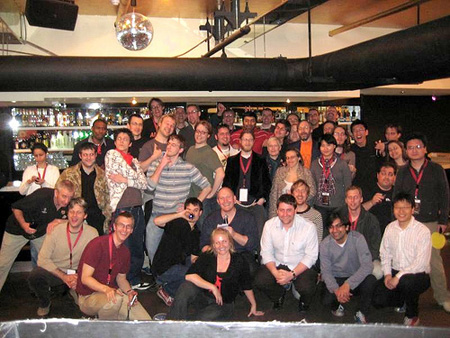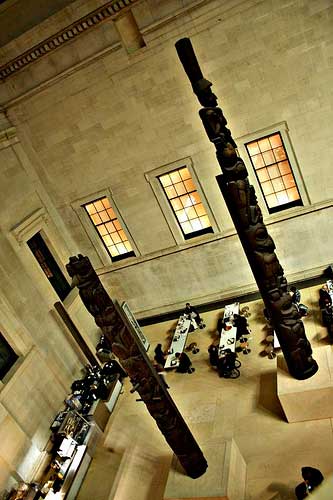dev8D: JISC Developer Happiness Days
Firstly some background as to why dev8D came about. David Flanders (JISC) and Ben O'Steen (Oxford University Library Services) over the years have attended many conferences: what they found were that the places and talks from which they benefited most were outside the programmed seminars and presentations. It was during conversations between sessions at these events with other developers, managers, delegates that they felt learned most.
For David and Ben the real benefit of these events were derived from the backchannel, the fringe events and random conversations. So they thought, why not set up an event for the developers like themselves in Higher Education (HE)? However, it would be an event that resembled the collaborative effort and the coming together of ideas that they felt was often missing from a lot of other events. Their aim was to devise an event that both addressed, and was driven by, the needs of developers like themselves.
Hence Developer Happiness Days, or dev8D for short, was born. If you are wondering where the name dev8D comes from, the '8D' represents a smiley face.
A Free-flowing Event
Considering the background of ideas that lead to dev8D it was quite a structured and yet nonetheless a free-flowing event. The first day was for 'n00bs' ('newbies') or beginners in English. It was designed for them to get to grips with some of the programming languages and techniques that HE developers, many would argue, should have in their armoury. This day-long session was lead by an international panel of speakers consisting of Brian Jinwright (Wofford College), Ben O'Steen (Oxford University Library Services), Dr Peter Sefton (Information Services, University of Southern Queensland) and Dr Robert Sanderson (Department of Computer Science, University of Liverpool).

The main topic covered during the day was the Python programming language. Each speaker had his own message to convey though the session was structured such that the audience being able to interrupt to ask questions. This was a great day which really helped everyone to see the uses and benefits of Python plus other rapid application development languages.
For anyone who missed the day the whole thing was being screen-cast live thanks to Ian Ibbotson. There was a parallel session running on the first day lead by Tony Hirst of the Open University which was about RSS and mash-ups.
Within These Walls
At the end of Day One, after checking in to the hotel and my home for the week, it was back out to the Hulu student union bar, where we had a room booked, nibbles on the tables and our own bar. The night-time meeting began with a Jerry Springer-style Question & Answer session with an esteemed panel of experts debating various points. Once again the audience was able to interject at any point to back up or rebuff any of the points made. Unfortunately I cannot report what was said at this Q&A as in order to liberate people's expression of their own opinions, an embargo was universally agreed that determined that what was said in the room stayed in the room. It is difficult to say with any certainty to what degree that régime liberated the group's candour, but there were several useful discussions and some interesting points raised.
The evening's entertainment was rounded off by the use of a big screen projector, large speakers and an Xbox 360 complete with Guitar Hero. I was lucky enough to be in possession of a Flip Cam curtesy of David Flanders and as something of a trial run and the opportunity to capture proceedings at the epicentre of the evening's entertainment made a video [1].
Base Camp and Lightning Talks
Tuesday, the second day of the event differed considerably from the previous day. The day's activities centred on the idea of having a base camp; where people could come back to, either to relax and reflect, or to discuss and/or code up ideas with other developers and take advantage of the on-tap refreshments. This is where everyone would meet in the morning for communal breakfast and to exchange stories of, and reactions to, the activities of the night before.
In fact Tuesday not only differed in its organisation from the first day's run of coding labs, it set the template for the rest of the week. Delegates were offered a schedule comprising a series of lighting talks from which people could pick and choose the sessions they felt would be most relevant to them as a developer. I started the day well by attending a talk by Mark van Harmelen. This was a really useful talk on how to create quick and useful prototypes simply using paper, rather than cumbersome tools on the computer, which can sometimes hinder the design process.
The other lighting talks I attended were run by what the event called 'Über users'. These users were slightly 'tech-savvy', but only to the extent that they were able to explain to us how we as developers could help them in their day-to-day lives in academia. There was a mix of students, teachers and researchers. It was a really useful opportunity for developers and users to meet and discuss each other's needs and requirements.
Individual Medley
Wednesday was the last day of what was called the 'individual medley'. At the beginning of the week each delegate was given five numbered poker chips. The idea of the game was to collect as many poker chips by 10pm Wednesday night. These could be gained in a variety of ways, from helping people get on to the event WIFI (a harder task than it sounded due to some of the limitations of the host venue's WIFI facilities), to writing some code for someone else, to a whole host of useful things that could be done for each other.

VIP King Pin Bowling Party (picture courtesy of dev8D).
Bowl Camp
Wednesday night was Bowl Camp. We were very lucky to have our own private bowling lanes complete with arcade machines, Nintendo Wii and platters of Pizza and other finger foods. It was at this bowl camp that the collected poker chips, could either be exchanged for drinks at the bar, or entered into the individual medley, but not both. There was chance for four people to each win a prize a Dell Mini 9. The first person Simin Kamali had a grand total of 38; second was Matt Zumwalt with 34; Mark Van Harmelen (and team) with 33; and fourth Julian Cheal with 25 chips. You may wonder why give out such expensive prizes at a conference? The simple answer is the organisers knew that, being developers, the award winners were sure to use those Netbooks, as they are generally known, for work purposes. And it would appear they were probably right, since in fact this article is being written on one of those prizes now, while the author is on a train.
Developer Decathalon
Thursday was more of a day to concentrate on the Developer Decathlon. This was a competition that enabled developers to come together face-to-face to do rapid prototyping of software ideas. This then went towards a screencast of their group's idea which was uploaded to the Web. Each group had a week from the Thursday to create a prototype and make a screencast. One of these ideas is Splash URL [2] which is a service that allows a presenter in a lecture to pass in a long URL which will then be shortened using a URL shortening service and which is then displayed in large text on the screen for the delegates to copy down with ease.
In setting up the competition, the organisers of dev8D created their very own Dragon's Den [3] consisting of Rachael Bruce, Jim Downing and Mark van Harmelen. Participating in the Dragons' Den myself, I felt they were much nicer than their television counterparts, and also much more helpful. Everyone taking part in the decathlon to whom I spoke, including myself, found that their critiques and comments were really helpful in refining the ideas submitted.
Thursday night was the occasion JISC chose to mark its recognition of the work of developers with the dinner at the British Museum. Having never been to the BM I must say I was impressed. We had a wonderful three-course meal accompanied by a delightful string quartet [4]. Planning the seating for this event must have been comparable to the BAFTAs. There were nine tables and nine people nominated for a developer award, so one could deduce that one nominee was seated at each table. There was then a good mix of people on each table, from HE developers to commercial developers with a mingling of managers as well.
Roll Your Own
Friday was a 'roll-your-own' event, i.e. you could choose what you wanted it to comprise. I attended the repository summit event, with talks from Fedora, DSpace, EPrints and also Microsoft, who are new to the repository world, but who gave a good insight in to where they feel they fitted into the market of the open source not-for-profit landscape that covers most of the UK's repositories. The mix of people at this day lead to some engaging discussions of what people thought institutional repositories were and what they thought they should be. Having the main three UK repository platforms plus Microsoft in one room, lead to in-depth conversations on how they all can build in solutions into their software in order to facilitate interoperability. Another outcome of attending the Developer Happiness days was that Chris Gutteridge of EPrints created a JSON exporter for the EPrints software. Using JSON will make it much easier for developers to use repository data in mash-ups on third-party sites or applications. Soon after this had been created, Marcus Ramsden started writing a plug-in for Firefox that will display information about an e-print before a user clicks on it in the repository.
Conclusion
What a busy week, with some great treats, but what was it all for? If you can attract 100+ talented people into a room and feed and water them, the ideas you may obtain in the process are much more valuable and more rapidly obtained than in reading project proposals and holding formal meetings. One telling example of this was the Happier Pipe by Sam Easterby-Smith [5] which plots how happy the delegates were during the week. The feedback from that alone was much more informative than an questionnaire after the event that is not always completed, let alone returned. The happiness pipe data were used by Ben O'Steen in his blog post [6] to create graphs to show over time the overall happiness of the dev8D delegates based on Sam's application. Some other interesting statistics that come out of the week led to a twitter account called randomdev8D which created surveys to which delegates could respond via twitter.
I hope this article will serve to bring together some of the considerable and varied content gathered by and at this event [7][8][9][10][11].
References
- YouTube - Rocking out at dev8D http://www.youtube.com/watch?v=qqqaEIY3l3A&feature=channel_page
- Splash URL. http://splashurl.net/
- BBC TV: Dragon's Den in which entrepreneurs seek investment in the Den from the Dragons, five venture capitalists willing to invest their own money in exchange for equity http://www.bbc.co.uk/dragonsden/
- Electric Violinist Sarah Tuke http://www.sarahtuke.com/
- Samscam Happier Pipe: A tool to measure developer-happiness http://samscam.co.uk/happier/
- Ben O'Steen's Web Blog http://oxfordrepo.blogspot.com/2009/02/tracking-conferences-at-dev8d-with.html
- Twitter search results for dev8D http://search.twitter.com/search?q=dev8D
- Flicker search results for dev8D http://www.flickr.com/search/?q=dev8D&w=all
- dev8D video interviews http://www.youtube.com/results?search_type=&search_query=dev8D+interviews&aq=f
- dev8D | Developer Happiness Days http://dev8D.jiscinvolve.org/
- JISC Developer Happiness Days, 9-13 February 2009, London http://www.dev8D.org/


